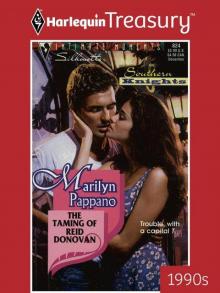- Home
- Pappano, Marilyn
Knight Errant Page 22
Knight Errant Read online
Page 22
The car pulled to a stop in front of O’Shea’s. It wasn’t a regular on the street. It was too new, too sporty. Anyone down here who could afford a car like that would spend the money instead moving elsewhere. Of course, any number of FBI agents could afford a car like that.
Lainie got out and unlocked the door while the driver came around the car. Had she called for help in locating Nicholas, or had she taken him at his word last night and arranged for a replacement? Maybe this guy was going to take over the baby-sitting while she went back home to her life in Atlanta. It wouldn’t be as much fun for Nicholas, but at least it would be honest.
Their steps sounded loud on the stairs, followed by the creak of her apartment door. Almost immediately, there was a knock at his own door. “Mr. Carlucci?”
He remained where he was, half sitting on the windowsill.
Another knock. “Mr. Carlucci, my name is Dolan. I’m with the FBI. Can I talk to you?”
He didn’t break his silence. They couldn’t be sure he was home. Lainie couldn’t have seen him from the street below because she’d never looked up. For all they knew, he could be anywhere in the city. Hell, in the hours since he’d left her, he could have gone anywhere in the country.
There was a sudden thud on the door, a fist driven by frustration connecting with the wood with enough force to startle him. “Open the damn door, Nicholas!” He’d made the same request of her only a week ago, when she had almost kissed him in the bar before jumping up from his lap and fleeing to the safety of her apartment. He had banged it hard, too, and had sworn, but she hadn’t relented.
He didn’t have to, but he did. Leaving the window, he crossed the room, opened the door only an inch or two, then returned to the sill. Slowly the door swung in—pushed by Dolan, no doubt. Judging by the emotion in her voice, Lainie would have shoved it hard enough to bounce off the wall.
The man looked to be in his early thirties. He was big, muscular, strong, but not particularly intimidating. The badge clipped onto his belt and the gun resting on his right hip helped improve that a little.
At his side, Lainie looked mutinous—and tired. If she’d spent the entire afternoon since he’d ditched her wandering around the Quarter, she should be tired. If he were a better man, he might feel guilty, but he hadn’t had the most restful twenty hours or so himself, and it was her fault.
Dolan extended his hand. Nicholas didn’t take it. If his refusal bothered the other man, it didn’t show. “Mr. Carlucci, I’m Sam Dolan. I’ve been working with Lainie since she came to New Orleans.”
So had he. The problem was, he hadn’t known it until yesterday.
“You’re not too happy with us right now. I understand that. What you need to keep in mind is that we’re just trying to do our job.”
“Oh, Lainie’s been doing much more than just her job, haven’t you, darlin’?”
She blushed. So did Dolan, who gave her a look and a nod of his head. Grudgingly she left the apartment, leaving the door open a few inches behind her. A moment later, her own door shut.
“Give her a break, would you? She’s in a tough enough position as it is. She had a good record with the bureau until she met you. Now she’s screwed. At best she’ll get a letter of censure, which will pretty much end her career. She’ll never get another promotion, and she’ll never work another major case. At worst, they’ll make an example of her and fire her. So lay off, would you?”
Nicholas shifted his gaze out the window. Across the street, the O’Sheas were gathered on the veranda—Jamey and Karen in matching rockers and Reid and Cassie sharing a newly hung porch swing with Sean. It was a nice homey scene, the sort that had never been part of his life, the sort that he’d begun to think maybe could be.
Deliberately he looked away from them, focusing instead on the empty building next door to Kathy’s House. At least he knew now that Lainie didn’t make a habit of sleeping with people involved with her cases and that sleeping with him had been her own idea, not her control agent’s, Sinclair’s or Kendricks’s. But he had known that anyway, even when he’d accused her otherwise. He’d known because he’d known her.
Knowing didn’t help much, though. There were still all those lies. So she hadn’t had a choice. So she’d told the truth whenever possible. That didn’t change the facts. She had come here under false pretenses. She had lied to everyone, especially him. She had made him fall in love with a woman who didn’t exist, not really. It was a major leap from the ex-waitress, hard-luck gardener and all-around-handyman helper he knew to the well-educated, well-paid federal agent she really was. The other Lainie could belong on Serenity. She could easily stay here, making a home out of that run-down cottage at the end of the street, building a business with hard work and determination, spending her days with her hands in the dirt and her nights with him.
But the real Lainie, the one with the college degree and the salary higher than four or five residents of Serenity combined, the one who wore suits to the office and lived in a good part of Atlanta and was undoubtedly contributing to a profitable investment plan... She didn’t belong here, and she certainly didn’t belong with him.
He looked at Dolan. “You may find this hard to believe, but some parts of my life are personal. That means they’re none of your business. Now, are you here for a reason?”
“Lainie says you want someone else moved in.”
“She’s wrong. I don’t want anyone here.” But that wasn’t true. He wanted her. He wanted her so damn badly that it hurt.
“Things are already pretty rough for her. If you have her removed, it’s going to get worse. Let her finish the case and salvage whatever she can. You don’t have to spend a lot of time with her. Just let her do her job. Don’t go out without telling her, and don’t give her the slip when you do go out. Remember that she’s trying to keep you alive. She’s willing to risk her life to protect yours. Give her a little credit for that.”
The last thing he needed on his conscience was Lainie risking her life for him. That alone was reason enough to send her away. He had just barely survived Rena’s death. If anything happened to Lainie...
“Her job’s not my responsibility,” he said coldly.
“It is when you refuse to let her do it.”
He stared hard at the interior wall, as if he could see through it, across the hall and through the next wall into Lainie’s apartment. He wouldn’t have to spend a lot of time with her, Dolan had said, but being with her wasn’t the problem. Being without her—living without her—was. Lying alone in his bed while she lay alone in hers was a problem. Knowing that wherever he was, whatever he was doing, she was somewhere nearby but still out of his reach was a problem.
Knowing that he could very well put her life in danger was a major problem.
But maybe there was a solution. Maybe she could minimize the damage she’d done to her career, and he could be free of the government’s attention for the first time in more years than he could remember. Maybe he could make a deal with her: he would let her stay—would let the FBI believe that she was doing her job by the book—and she would stay out of his way. It would benefit them both, and it should keep her out of danger. After the harm he’d helped do to her reputation within the bureau, it seemed the least he could do.
That brought him a moment’s pause. There was something tremendously unsettling about knowing that, in having a relationship with Lainie—in doing nothing more than spending time with her, liking her, having feelings of both a sexual and a romantic nature toward her and acting on those feelings—he had helped damage irreparably an honorable career. He hadn’t done anything that millions of men before him hadn’t already done, but because of who he was, it would cost her dearly. It wasn’t fair. She deserved better.
But she wanted him.
“I’ll think about it,” he said, then gestured toward the door. “Close the door on your way out.”
Chapter 9
Lainie lay on the couch, staring at the ceiling. Her feet we
re propped on the sofa arm, her head butted against the opposite arm. A fold of teal sheet that had come loose was puffed out above her head, limiting her view, but it didn’t matter. There wasn’t anything in here that she wanted to see.
It had been a hell of a day. Her head ached, her feet hurt, and her heart was sore. She had seen more of the French Quarter and its environs today than she’d ever intended to see. She had wandered through block after block of shops, restaurants and bars, some of them seedy enough to make O’Shea’s look like a first-class establishment. She had been met with suspicion, curiosity, a total lack of interest and, in a strip club on Bourbon, a proposition or two. She’d been worried sick, hurt and upset, and after the first two hours, her feet, in shoes not intended for endless traipsing, had started to blister. Then Sam had brought her back here and Nicholas had given her that bitter mocking look as he’d gotten in one more hurtful shot.
It was times like these when she missed her mother the most, when the unfairness of life smacked her between the eyes. Elaine Ravenel had had an extraordinary understanding of unfairness—and an extraordinary capacity for coping with it. The situation with Lainie’s father must have been unbearable, but she’d given little sign of it. The first hint Lainie had had that something was seriously wrong was finding her mother in the garden that long-ago spring day. Before then she had always been all smiles and warmth, full of advice, encouragement and love whenever Lainie had needed them.
More than anything else, Lainie needed the love. She would give anything to have the kind of love the people around her enjoyed—from a friend, a sibling, a parent, a spouse, a child. It had been missing ever since her mother’s death. Her father’s love had been warped, and her brother’s had come from a distance. If her husband had ever loved her, it had died an early death, and while the man she had almost married had been fond of her, there’d been no emotion more intense than desire. All her adult life, she’d been looking for someone to love her, and she’d dared to dream that Nicholas was the one.
Unless he was a more forgiving man than she’d given him credit for, she’d been wrong again.
Feeling queasy from lack of food, she slowly sat up and swung her feet to the floor. There was always sandwich stuff in the refrigerator, so Jamey could feed the occasional hungry customer, along with a half-dozen dinners in the freezer. She could fix a solitary meal and eat it in front of the television in the bar, or she could bring it back up here to this quiet lonely place and listen to the silence. The one thing she couldn’t do was go out, not unless Nicholas went, too, and somehow she didn’t think that sitting at a table across from her and trying to eat was high on his list of favorite things to do tonight.
Walking carefully because her feet were sore and quietly because she didn’t want to disturb Nicholas across the hall, she went downstairs. She settled on a sandwich because it was quick and easy and didn’t stick on the lump that seemed to have settled permanently in her chest. She carried it into the bar, lit only by the single bulb in the hallway, and settled at a table against the far wall, where she ate staring at nothing more interesting than the shadows in the room, thinking of nothing more important than finishing the meal and getting through the next hour. If she survived it, then she would concentrate on the next one, and later rather than sooner it would be morning and time for her to go work.
If she still had a job. Now that Nicholas knew the truth, there was no reason to continue the charade with the O’Sheas. Because of their fondness for Nicholas and because they hadn’t invested as much of themselves in a relationship with her as he had, they would take the news more kindly than he had, but they still might feel that she’d taken advantage of their generosity and betrayed their friendship. Sooner or later, they would want her gone from Kathy’s House and out of the apartment, and then where would she go?
She felt the same anxious fear she’d felt twenty-one years ago when she’d left home. She had known she was going to Athens and where she would bunk for the first few weeks, but she’d had no answers beyond that. She hadn’t known where she would eventually live, whether she would be able to find a job or how she could manage school and work and a poverty-level budget. All she’d known was that she had to go. She couldn’t live one minute longer in her father’s house.
Now the day was approaching when she would have to leave here. She didn’t know where she would go or what she would do when she got there. Even though she was a mature adult with job skills, an education and a healthy savings account, she was more scared than she’d ever been as that eighteen-year-old. Of course, back then she’d been running away from the father she’d despised. This time she would be forced away by the man she loved. It was a big difference.
In the stillness of the bar, her sigh sounded big and so sad that it was blue. What she needed was a cold beer and a long, steamy hot bath. Her entire body was achy, the muscles tight from a full twenty-four hours of stress. Maybe a bath, a beer and sheer exhaustion would help her get a little sleep tonight—or maybe she would spend another night curled up in a ball, staring out the window, her eyes gritty and too dry for tears.
She popped the top on a bottle of beer taken from the cooler behind the counter, then returned to the table to replace the chair, legs in the air, and claim the napkin she’d left. She was halfway across the room when the lights went on, making her blink before she could focus on Nicholas. He stood motionless at the end of the bar, with the aspirin bottle she’d noticed the day she’d moved in clutched in one hand. She had thought at the time that he seemed more likely to give headaches than to suffer them himself. Her headache was her own—a consequence of stress, too many smoky bars and too much regret—but he’d given her a hell of a heartache.
He moved first, starting toward her, and she involuntarily backed a few steps away. He stopped a few yards away, with less than six feet and a world of anger separating them. “I have a proposition. Your pal Dolan wants you to stay here. He thinks maybe you can salvage something of your career if you stay and don’t screw up anymore.”
By “screw up,” he meant have sex with him. As cold as he was right now, she didn’t think that was even a remote possibility.
“You were right. If I throw you out, they’re going to send someone else in. So I’ve decided that you can stay and pretend that you’re doing your job.”
“And what do you get out of this?” She was surprised that her voice worked, that it was mostly steady, a little cool and not at all pleading.
“You stay out of my way. You don’t interfere. You don’t tag along when I go out. You don’t do your job, and I don’t tell anyone you’re not.”
She shook her head. “I can’t do that. It’s not how I work.”
“Oh, I’ve seen how you work, darlin’. Mostly on your—” As he broke off, shame flushed his face a deep bronze. Of course, her mind had already supplied the finishing touch to his insult. Mostly on your back.
“You didn’t have any objections at the time,” she reminded him, her voice a pained whisper.
“No, I didn’t.” He met her gaze, looked away, then back again. “At the time, I thought I was pretty damn lucky.”
“But not anymore.” His answer was no answer at all. It was enough to hurt. “I can’t accept your proposition. I don’t care about salvaging my career. As I told you, I’m quitting.”
“You planning to get out before they fire you?”
“I don’t care whether they fire me or censure me or throw a big parade in my honor. I don’t want the job anymore.”
“You want a house. And a nursery.”
A month ago the idea of quitting her job had never entered her mind. She had been content with the idea of putting in thirty years, then retiring a white-haired old maid. If anyone had suggested anything different, she would have laughed. If anyone had suggested that she might ever want to start a nursery and live in a shabby, run-down house in a violent, run-down neighborhood, she would have been appalled.
Tonight she just felt wistf
ul.
“I want a lot of things I know I’ll never have.”
“Am I one of them?”
She tried to look away, but his dark gaze trapped her. She had no idea what he wanted to hear—truth or a lie—or how he would react. Would he believe her, or would he mock her, scorn her, explain to her in very blunt terms exactly how little he wanted her? It didn’t matter. He couldn’t make her feel any more hopeless than she already did. “Yes,” she said quietly, truthfully. “You come—”
Her admission was interrupted by the sound of breaking glass, mingled with earsplitting reports and dull thuds. Someone was shooting at them, spraying the front of the building with what sounded like an AK-47. Lainie had no time to react before Nicholas dove to the floor, pulling her down with him, maneuvering her underneath him. She struggled against him, pushing to dislodge him. “Let me up! I’ve got to get my gun...got to see... Damn it, Nicholas, let me go!”
His only response was to shift more of his weight onto her body, pressing her hard against the floor as the gunfire continued, the shots coming too quickly to separate, tearing through the shutters, sending slivers of wood and pieces of glass flying across the room. When the beer bottle she still held shattered in a spray of glass and foam, she jerked her hand to her body, squeezing it into the minuscule space between her chest and his. In her trembling fingers she could feel the rapid beat of his heart and knew her own matched it.
She whispered silent prayers as the gunman strafed the building from one side to the other. They should be moving, crawling along the floor until they reached the hallway. There was no way an AK could penetrate both the outside brick wall and the thick inner wall. But before she could make her voice work to give Nicholas the command to move, as suddenly as the shooting had started, it ended. The silence rang in her ears, and the trembling in her hands spread through her body. In all her years with the bureau, this was the first time anyone had ever shot at her, the first time her life had ever been in danger, and she was shaken.

 Convincing Jamey
Convincing Jamey Knight Errant
Knight Errant The Taming Of Reid Donovan
The Taming Of Reid Donovan Criminal Deception
Criminal Deception